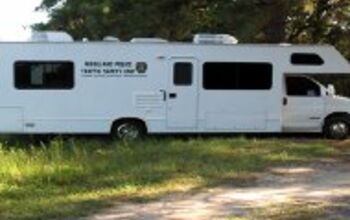South Carolina: AAA Endorses Illegal Speed Trap
A century ago, the forerunners of the American Automobile Association (AAA) provided a service that warned motorists about upcoming speed traps. AAA Carolinas turned away from this history and used its considerable influence on Monday to support a speed trap declared illegal by South Carolina’s attorney general and several of its lawmakers. Since August, the tiny town of Ridgeland has allowed a private company to operate a speed camera on Interstate 95 in direct defiance of a state law enacted in June specifically to stop the program ( view law).
“All branches of government are facing constricting budgets,” a AAA Carolinas statement explained. “Law enforcement agencies will not be able to simply add staff to handle the growing traffic volume and therefore must look to creative solutions to do more with less. This photo-radar enforcement program in the Town of Ridgeland is one such example and should be replicated as opposed to rejected.”
AAA insisted Ridgeland was not a speed trap because the profit for the city was not significant for the town of 2500. A total of 8000 tickets have been mailed since August, with Ridgeland’s cut worth about $196,000. The private contractor iTraffic will pocket the same amount while the state retains the largest share. AAA based its arguments on material provided by town Mayor Gary W. Hodges who has been furiously lobbying against the legislative assault brewing in Columbia.
Hodges testified on January 26 before a state Senate Transportation subcommittee that his system did not run afoul of the law that targeted Ridgeland. He pointed out a provision that stated traffic tickets could not be “solely” based on photographic evidence.
“The primary evidence in every citation is officer observation supported by radar technology and photographic evidence,” Hodges said. “There is an officer observing every violation, if the machine clocks a violation when he is not looking, he deletes it. That is his instruction. If he needs to get up and go to the restroom, he puts the system on pause.”
Subcommittee members were not convinced, as the mayor himself described a system that operates on autopilot. One state senator sarcastically pointed out that the police officer, whose salary is covered by iTraffic, must have been “real observant” when he failed to notice one of the speed cameras was rammed by a motorist.
“We can’t put issuing any kind of tickets on autopilot,” state Senator George E. Campsen (R-Charleston) said. “There’s got to be an ability for people to give a defense.”
Senate Transportation Committee Chairman Larry Grooms grilled Hodges to determine what authority Hodges claimed to operate the program. After Hodges implied that the attorney general had backed away from the decisions that found the program in violation of the law, Grooms zeroed in and asked Hodges directly whether he had any legal opinion or notes from his meetings with the attorney general that suggested what he was doing was legal.
“No sir, not from the attorney general, no sir,” Hodges admitted.
The full South Carolina Senate is poised to consider a bill that Grooms introduced, S. 336, that bans the use of tickets based “in whole or in part” on photographic evidence whether or not the device is attended or unattended. The committee struck a provision that would have imposed a $500 penalty for each ticket the system had issued without legal authority.
AAA now derives a significant portion of its revenue from automobile insurance, an amount that increases for each photo enforcement ticket issued in states like California and Arizona where license points apply to photo tickets.
[Courtesy: Thenewspaper.com]
More by The Newspaper
Latest Car Reviews
Read moreLatest Product Reviews
Read moreRecent Comments
- CanadaCraig As an aside... you are so incredibly vulnerable as you're sitting there WAITING for you EV to charge. It freaks me out.
- Wjtinfwb My local Ford dealer would be better served if the entire facility was AI. At least AI won't be openly hostile and confrontational to your basic requests when making or servicing you 50k plus investment and maybe would return a phone call or two.
- Ras815 Tesla is going to make for one of those fantastic corporate case studies someday. They had it all, and all it took was an increasingly erratic CEO empowered to make a few terrible, unchallenged ideas to wreck it.
- Dave Holzman Golden2husky remember you from well over decade ago in these comments. If I wanted to have a screen name that reflected my canine companionship, I'd be BorderCollie as of about five years go. Life is definitely better with dogs.
- Dave Holzman You're right about that!


































Comments
Join the conversation
Once upon a time, AAA sanctioned automobile races for the FIA. Now, they are just a travel agency and insurance company. We gave up on them more than 30 years ago. We have towing riders for all of our cars. I have had to use them several times. No complaints from our insurance company.
When AAA decided to get into the insurance game, it became all about profitability and posting income increases for the company, away from it's core business of HELPING people out. When you have actuaries are running the company, always pushing for the next squeeze of the dime, a company like AAA becomes just like any other greedy insurance company: it's about SAVING money, not spending it. I honestly believe that the 2 hr wait times that most AAA members encounter are done so that the member just gives up and goes somewhere else to get PAID help, instead of the free one that AAA offers for it's members. As for the poster who said they were cut from AAA's program from using it too much, I would have asked for a refund for the yearly membership citing that you felt baited and switched for paying for the membership if that was the case, or gotten at least a pro-rated return for the time that was left in the membership period. That's just not right to make people feel like they have a sense of security when it's obviously NOT that secure. I used to be in AAA too, won't go back to them ever again, and I wish they would stop sending me the "come back to us" mailings, they are just really annoying!